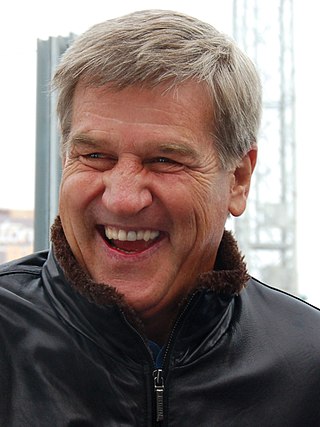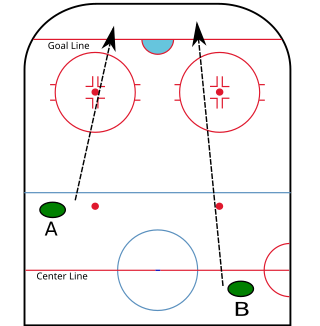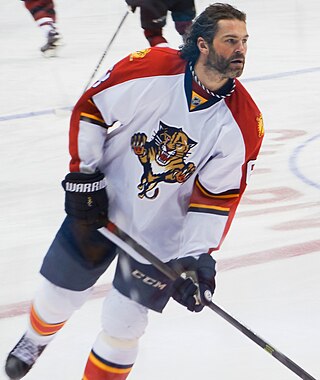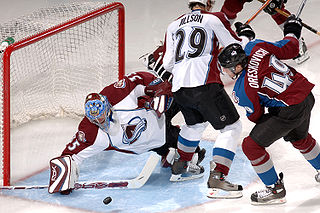
Ice hockey is a team sport played on ice skates, usually on an ice skating rink with lines and markings specific to the sport. It belongs to a family of sports called hockey. Two opposing teams use ice hockey sticks to control, advance, and shoot a vulcanized rubber hockey puck into the other team's net. Each goal is worth one point. The team with the highest score after an hour is declared the winner; ties are broken in overtime. In a formal game, each team has six skaters on the ice at a time, barring any penalties, including a goaltender. It is a full contact game and one of the more physically demanding team sports.

Robert Gordon Orr is a Canadian former professional ice hockey player, widely acknowledged as one of the greatest of all time. Orr used his skating speed, scoring, and play-making abilities to revolutionize the position of defenceman. He played in the National Hockey League (NHL) for 12 seasons, the first 10 with the Boston Bruins, followed by two with the Chicago Black Hawks. Orr remains the only defenceman to have won the league scoring title with two Art Ross Trophies. He holds the record for most points and assists in a single season by a defenceman. Orr won a record eight consecutive Norris Trophies as the NHL's best defenceman and three consecutive Hart Trophies as the league's most valuable player (MVP). Orr was inducted into the Hockey Hall of Fame in 1979 at age 31, the youngest to be inducted at that time. In 2017, Orr was named by the National Hockey League as one of the "100 Greatest NHL Players" in history.

The "Miracle on Ice" was an ice hockey game during the 1980 Winter Olympics in Lake Placid, New York. It was played between the hosting United States and the Soviet Union on February 22, 1980, during the medal round of the men's hockey tournament. Though the Soviet Union was a four-time defending gold medalist and heavily favored, the United States upset them and won 4–3.

Brett Andrew Hull is a Canadian–American former ice hockey player and general manager, and currently an executive vice president of the St. Louis Blues of the National Hockey League (NHL). He played for the Calgary Flames, St. Louis Blues, Dallas Stars, Detroit Red Wings, and Phoenix Coyotes between 1986 and 2005. His career total of 741 goals is fifth highest in NHL history, and he is one of five players to score 50 goals in 50 games. He was a member of two Stanley Cup winning teams — 1999 with the Dallas Stars and 2002 with the Detroit Red Wings. In 2017, Hull was named one of the 100 Greatest NHL Players in history.
The Summit Series, Super Series 72, Canada–USSR Series, or Series of the Century, was an eight-game ice hockey series between the Soviet Union and Canada, held in September 1972. It was the first competition between the Soviet national team and a Canadian team represented by professional players of the National Hockey League (NHL), known as Team Canada. It was the first international ice hockey competition for Canada after they had withdrawn from such competitions in a dispute with the International Ice Hockey Federation (IIHF). The series was organized with the intention to create a true best-against-best competition in the sport of ice hockey. The Soviets had become the dominant team in international competitions, in which the Canadian professionals were ineligible to play. Canada had had a long history of dominance of the sport prior to the Soviets' rise.

In ice hockey, a goal is scored when the puck entirely crosses the goal line between the two goal posts and below the goal crossbar. A goal awards one point to the team attacking the goal scored upon, regardless of which team the player who actually deflected the puck into the goal belongs to. Typically, a player on the team attempting to score shoots the puck with their stick towards the goal net opening, and a player on the opposing team called a goaltender tries to block the shot to prevent a goal from being scored against their team.
Short-handed is a term used in ice hockey and several related sports, including water polo, and refers to having fewer players on the ice during play, as a result of a penalty. The player removed from play serves the penalty in the penalty box for a set amount of time proportional to the severity of the infraction. If a goaltender commits a minor infraction, another player who was on the ice at the time of the penalty serves, often but not necessarily the team captain.

In ice hockey, icing is an infraction that occurs when a player shoots, bats, or deflects the puck from their own half of the ice, beyond the opposing team's goal line, without scoring a goal.

The centre in ice hockey is a forward position of a player whose primary zone of play is the middle of the ice, away from the sideboards. Centres have more flexibility in their positioning and therefore often end up covering more ice surface than any other player. Centres are ideally strong, fast skaters who are able to backcheck quickly from deep in the opposing zone. Generally, centres are expected to be gifted passers more so than goal scorers, although there are exceptions - typically larger centres who position themselves directly in front of the net in order to score off rebounds. They are also expected to have exceptional "ice vision", Hockey IQ, intelligence, and creativity. They also generally are the most defensively-oriented forwards on the ice, as they are expected to play the role of the third player in defense, after the defencemen. Centres usually play as part of a line of players that are substituted frequently to keep fresh and keep the game moving.

Winger, in the game of ice hockey, is a forward position of a player whose primary zone of play is along the outer playing areas. They typically flank the centre forward. Originally the name was given to forward players who went up and down the sides of the rink. Wingers generally have the least defensive responsibilities out of any position on the ice, however they are still tasked with defensive duties such as forechecking duties or covering the point in the defensive zone.

Defence or defense in ice hockey is a player position that is primarily responsible for preventing the opposing team from scoring. They are often referred to as defencemen, D, D-men or blueliners. They were once called cover-point.

In ice hockey, the goaltender is the player responsible for preventing the hockey puck from entering their team's net, thus preventing the opposing team from scoring. The goaltender mostly plays in or near the area in front of the net called the goal crease. Goaltenders tend to stay at or beyond the top of the crease to cut down on the angle of shots. In the modern age of goaltending there are two common styles, butterfly and hybrid. Because of the power of shots, the goaltender wears special equipment to protect the body from direct impact.
Checking in ice hockey is any of a number of defensive techniques aimed at disrupting an opponent with possession of the puck or separating him or her from the puck entirely. Most types are not subject to penalty.

A shot in ice hockey is an attempt by a player to score a goal by striking or snapping the puck with their stick in the direction of the net.
This is a list of common terms used in the sport of ice hockey along with the definitions of these terms.

A rover was a position in ice hockey used in the late nineteenth and early twentieth century. At the time ice hockey consisted of seven positions: the rover, along with the goaltender, two defencemen, and three forwards; the other positions still remain. Unlike the others, the rover did not have a set position, and roamed the ice at will, going where needed, much as a midfielder in association football might.
The Flyers–Red Army game was a famous international ice hockey game played on January 11, 1976, between the Philadelphia Flyers of the North America-based National Hockey League (NHL), and HC CSKA Moscow of the Soviet Union.
In ice hockey, a line is a group of forwards who play in a group, or "shift", during a game.
The forecheck is an ice hockey defensive coverage play made (primarily) in the offensive zone with the objective of applying pressure to the opposing team to regain control of the puck. It is a type of checking. Forechecking is generally executed in one of three situations: recovery of the puck after a dump in, after the rebound following a scoring attempt, or immediately after a turnover to regain possession. Forechecking can be aggressive or conservative depending on the coaching style and on the skating skills of the players.
The National Hockey League All-Star Skills Competition, officially the NHL All-Star Game SuperSkills Competition during certain past years, is an event on the night preceding the National Hockey League All-Star Game. Started at the 41st National Hockey League All-Star Game in Pittsburgh in 1990, the NHL uses the event to showcase the talents of its all-star participants. The All-Star teams select representatives for each event, with points awarded to the winning team.












